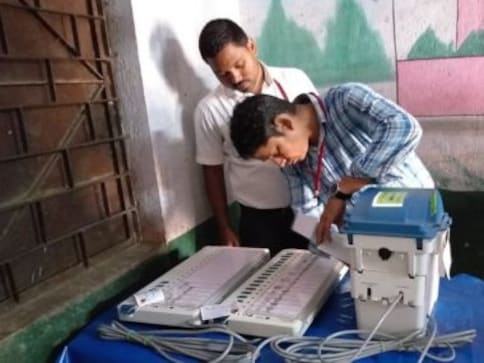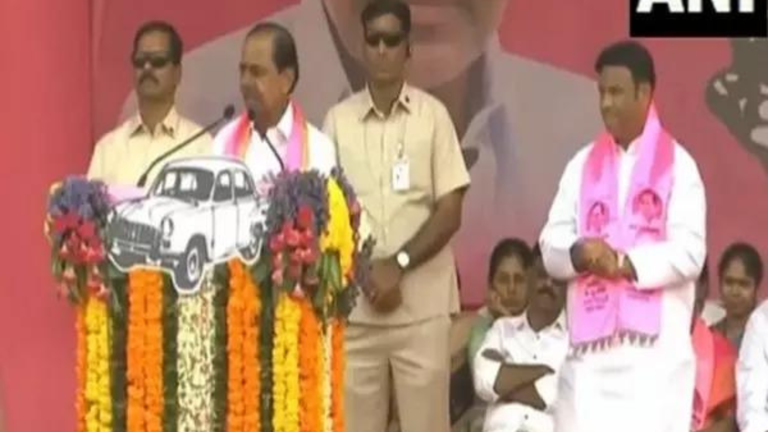‘Coalition government will be formed post-2024 Lok Sabha election’: Telangana CM

‘Coalition government will be formed post-2024 Lok Sabha election’: Telangana CM
The statement by Bharat Rashtra Samithi (BRS) President and Telangana Chief Minister K Chandrashekar Rao about the formation of a coalition government at the Centre post the 2024 Lok Sabha election suggests a perspective on the evolving political landscape in India.
Rao’s prediction hints at a potential shift from a single-party dominance at the national level to a more collaborative and diverse political scenario. The mention of an amalgamation of regional parties rather than national parties in the formation of the central government emphasizes the growing influence and significance of regional political entities in shaping the country’s political narrative.
Coalition governments, where multiple parties come together to form a government, have been a part of India’s political history. They often arise when no single party secures a clear majority in the Lok Sabha elections. Regional parties, representing specific states or regions, play a crucial role in such coalition formations.
The Chief Minister’s prediction reflects the belief in the increasing relevance of regional parties and their potential to collectively shape the direction of the national government. It also underscores the idea that future political alliances and coalitions may be more fluid and dynamic, with parties aligning based on regional interests and shared policy goals.

While predictions about future political scenarios are inherently uncertain, they can provide insights into the evolving dynamics of Indian politics. The emphasis on a coalition involving regional parties suggests a recognition of the diversity and pluralism in India’s political landscape, where regional issues and aspirations play a significant role in shaping the political agenda.
It will be interesting to observe how political developments unfold in the lead-up to the 2024 Lok Sabha elections and whether regional parties indeed play a central role in shaping the formation of the central government, as predicted by K Chandrashekar Rao. Political landscapes can be dynamic, and alliances often shift based on changing circumstances and priorities.
Telangana Chief Minister K Chandrashekar Rao’s statement about the formation of a coalition government after the 2024 elections and his critique of the Congress party reflects the evolving political dynamics and alliances in India.
His assertion that a coalition government, not a single-party governance, will emerge after the 2024 elections aligns with the historical trend of coalition politics in India, especially when no single party secures a clear majority. The emphasis on an amalgamation of regional parties rather than national parties highlights the growing influence of regional politics and the potential for regional entities to play a pivotal role in national governance.
Rao’s comments suggest a strategic approach of building alliances and consolidating regional support to have a significant impact on the national political stage. The idea of showcasing power in Delhi after winning across all Member of Parliament (MP) seats underscores the importance of regional parties in shaping the political narrative at the national level.
His criticism of the Congress for allegedly using certain communities, particularly Muslims, as vote banks and questioning the party’s role in the demolition of the Babri Masjid reflects the ongoing discourse around identity politics and historical events. Accusations of vote bank politics are not uncommon in Indian political rhetoric, and discussions surrounding events like the Babri Masjid demolition continue to be politically charged.
Overall, K Chandrashekar Rao’s statements provide insights into the political strategies and narratives that may shape the upcoming elections. The focus on regional parties, coalition governance, and critiques of rival political entities contribute to the broader discourse on the future direction of Indian politics. As political landscapes evolve, it remains to be seen how these predictions and narratives translate into actual political developments in the post-2024 political scenario.
Telangana Chief Minister K Chandrashekar Rao’s (KCR) recent statements encompass a spectrum of political critique, historical references, and a firm commitment to secular governance. His remarks can be analyzed in a cohesive narrative:
KCR begins by accusing the Congress of engaging in vote bank politics, particularly targeting specific communities such as Muslims. This allegation aligns with a common criticism in Indian politics where parties are accused of exploiting demographic segments for electoral gains.
He questions the sincerity of Congress’s pledge to shut down what he terms as the “shop of hatred,” suggesting a skepticism toward performative actions by political parties that may not address the root causes of communal tension.
The Chief Minister delves into a sensitive historical event, the demolition of the Babri Masjid, raising questions about responsibility. This historical reference serves a dual purpose—bringing attention to a critical event and potentially highlighting the perceived shortcomings or culpability of political opponents.
KCR asserts that under his leadership since 2014, Telangana has not witnessed communal rites, emphasizing a claim of maintaining communal harmony. This assertion aims to showcase his administration as one that prioritizes stability and inclusivity.
His declaration that Telangana will remain secular as long as he is alive underscores a personal commitment to the principles of secular governance. This statement could be an effort to project a leadership style that values inclusivity, irrespective of religious affiliations.
In summary, KCR’s statements form part of a larger political narrative that emphasizes regional autonomy, critiques opponents, and underscores a commitment to secular and inclusive governance. To fully comprehend these statements, it is crucial to contextualize them within the broader political landscape and understand the specific dynamics and challenges facing the region.
The statements made by Telangana Chief Minister K Chandrashekar Rao (KCR) about unity and collaboration between Muslims and Hindus reflect an attempt to promote communal harmony and inclusivity in the state. His emphasis on people working together, irrespective of religious affiliations, is a message of unity and shared responsibility.
The political landscape in Telangana is gearing up for a triangular contest among the Bharatiya Janata Party (BJP), Bharat Rashtra Samithi (BRS), and the Congress. KCR’s party, formerly known as Telangana Rashtra Samithi (TRS) and now Bharat Rashtra Samithi (BRS), dominated the previous Assembly elections in 2018, winning 88 out of 119 seats and securing a significant vote share. The upcoming elections, scheduled for November 30, will determine the political direction of the state.
KCR’s assertion of collaboration and mutual support between Muslims and Hindus aims to project an image of inclusive governance, potentially appealing to a broad spectrum of voters. Such statements can influence public perception, especially in a diverse and pluralistic society like India.
The electoral landscape in Telangana seems competitive, with the BJP and Congress vying for political space against the incumbent BRS. KCR’s message of unity may be an attempt to consolidate support across communities and project a vision of a harmonious and cooperative society.
As the state heads toward elections, these political dynamics, along with the messaging of leaders, will play a crucial role in shaping voter sentiments. The outcome of the elections will determine the future governance and political trajectory of Telangana. The scheduled counting of votes on December 3 will reveal the extent of support for the various political parties and the preferences of the electorate in the state.





